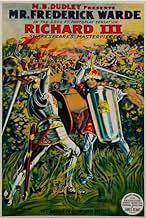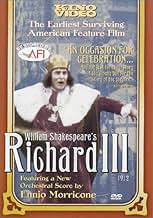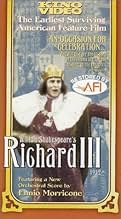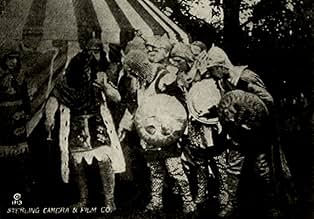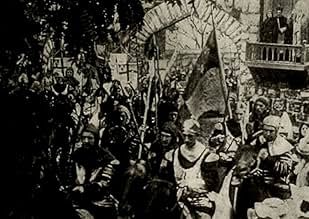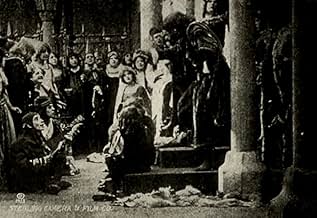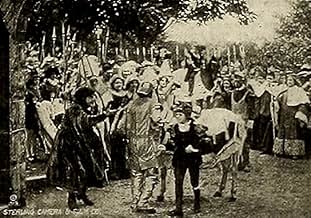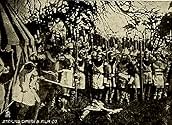Aggiungi una trama nella tua linguaRichard of Gloucester uses manipulation and murder to gain the English throne.Richard of Gloucester uses manipulation and murder to gain the English throne.Richard of Gloucester uses manipulation and murder to gain the English throne.
- Regia
- Sceneggiatura
- Star
Recensioni in evidenza
Besides its historical importance, this silent screen adaptation of Shakespeare's "Richard III" is a pretty good movie in its own right. It has several good features that compensate for the lack of dialogue and the other cinematic limitations of the time. The result is something a bit different from watching the play, but still a good story that does retain much of the emphasis of the original.
The adaptation is noteworthy for the liveliness and the detail that went into most of the scenes. They also made generally good decisions in adapting the story, by high-lighting the parts that would work most effectively on film without dialogue, and also in filming some events that were not actually in the play but to which characters in the play refer. While the lack of dialogue means that the character of Richard is not as complex as he is in the play, Frederick Warde does a good job of making his basic character come out. Some of his scenes work better than you might have expected them to without the advantage of spoken lines. The camera is fixed for each scene, as was then the norm, and it also uses the old-fashioned 'tableau' format, but there are a number of uses of cross-cutting, and there are also a couple of simple tracking shots at effectively chosen moments.
Overall, this is creative for its era, and it works quite well. It deserves to be seen in its own right, as well as for its more well-known historical significance.
The adaptation is noteworthy for the liveliness and the detail that went into most of the scenes. They also made generally good decisions in adapting the story, by high-lighting the parts that would work most effectively on film without dialogue, and also in filming some events that were not actually in the play but to which characters in the play refer. While the lack of dialogue means that the character of Richard is not as complex as he is in the play, Frederick Warde does a good job of making his basic character come out. Some of his scenes work better than you might have expected them to without the advantage of spoken lines. The camera is fixed for each scene, as was then the norm, and it also uses the old-fashioned 'tableau' format, but there are a number of uses of cross-cutting, and there are also a couple of simple tracking shots at effectively chosen moments.
Overall, this is creative for its era, and it works quite well. It deserves to be seen in its own right, as well as for its more well-known historical significance.
Historically important as it is the oldest known complete surviving feature film made in the US, Richard III does a decent enough job of making Shakespeare's play accessible to the masses - although watching a Shakespeare play without words is like looking at a portrait in a dark room. The faces pulled by Shakespearean stage actor Frederick Warde suggest he thinks he's still playing to the Gods.
Like many a heralded silent movie, this was lost for many years. Then it turned up in a private collection, and was donated to the AFI. They got Ennio Morricone to write a score and released it, claiming it was the first American feature, and the first Shakespearean feature.
It's true enough that Shakespeare is credited as a writer, and it follows the events of his play, but to offer a silent version of Shakespeare with not one of his lines seems to me to avoiding the pith and purpose of Shakespeare. True, few can cite more than three lines: "A horse, a horse, my kingdom for a horse"; "Now is the winter of our discontent made glorious summer by the sun of York"; and "Was ever a woman in this humor wooed? Was ever a woman in this humor won?" And usually they don't understand the second and misquote the third as "Was ever a woman so rudely wooed?". This led me and a friend to plot a production with Groucho Marx as Richard, Margaret Dumont as Anne, with similar casting throughout.
Not one of Shakespeare's lines is offered, reducing the play to sheer pomp and pageantry. This avoids the problem that Richard is one of Shakespeare's worst-written characters: an enormously cynical, murderous, and successful politician until he becomes King, who then turns into an idiot; a cowardly and feeble hunchback who is a monstrously courageous and doughty warrior in war. All this in service of the Elizabethan-era truth that he should never have been king, and that her grandfather performed a valiant deed by slaying Richard on the battlefield.
The result is a movie made in the Illustrated Text style of movie making without quoting one line of text. There are lots of extras shaking spears. I suppose that's enough for people who want to say they've seen Shakespeare. As for Frederick Warde, who plays Richard here, he later wrote
"I found the action of the camera necessitated entirely different methods of acting from the stage. Spontaneity must be replaced by deliberation and concentrated expression take the place of words. I had much to learn and considerable to unlearn but the director and photographer were very considerate, although my ignorance of the necessities of the camera must have tried their patience almost to the limit."
Which brings us back to another popular Groucho quote. Enough said.
It's true enough that Shakespeare is credited as a writer, and it follows the events of his play, but to offer a silent version of Shakespeare with not one of his lines seems to me to avoiding the pith and purpose of Shakespeare. True, few can cite more than three lines: "A horse, a horse, my kingdom for a horse"; "Now is the winter of our discontent made glorious summer by the sun of York"; and "Was ever a woman in this humor wooed? Was ever a woman in this humor won?" And usually they don't understand the second and misquote the third as "Was ever a woman so rudely wooed?". This led me and a friend to plot a production with Groucho Marx as Richard, Margaret Dumont as Anne, with similar casting throughout.
Not one of Shakespeare's lines is offered, reducing the play to sheer pomp and pageantry. This avoids the problem that Richard is one of Shakespeare's worst-written characters: an enormously cynical, murderous, and successful politician until he becomes King, who then turns into an idiot; a cowardly and feeble hunchback who is a monstrously courageous and doughty warrior in war. All this in service of the Elizabethan-era truth that he should never have been king, and that her grandfather performed a valiant deed by slaying Richard on the battlefield.
The result is a movie made in the Illustrated Text style of movie making without quoting one line of text. There are lots of extras shaking spears. I suppose that's enough for people who want to say they've seen Shakespeare. As for Frederick Warde, who plays Richard here, he later wrote
"I found the action of the camera necessitated entirely different methods of acting from the stage. Spontaneity must be replaced by deliberation and concentrated expression take the place of words. I had much to learn and considerable to unlearn but the director and photographer were very considerate, although my ignorance of the necessities of the camera must have tried their patience almost to the limit."
Which brings us back to another popular Groucho quote. Enough said.
After watching RICHARD III, I found the film endlessly fascinating. Part of the fascination lies in the age of the film itself. You rarely get to see a film from 1912 much less one in excellent condition. I felt as if I had gone back in time to a 19th century theatre which in effect I had as the actor playing Richard (Frederick Warde) was a legendary stage actor who came out of retirement to reprise his favorite role on film and have it captured for posterity. Much of RICHARD III is appropriately theatrical in nature with very theatrical sets but it is the exteriors that turn it into a real motion picture. Although the camerawork is static, the editing is imaginative and keeps it from being just a filmed play.
The DVD transfer of the film is remarkable. The color tints (mostly yellow and red) are effective and the print looks great for the vintage. The period intertitles are intriguing with Gloucester spelled phonetically (Gloster) for some reason. The commissioned score from Ennio Morricone is powerful, relentless, and highly effective. I strongly recommend this title to anyone interested not only in early movies but also in theatre history. This is a rare opportunity to see a genuine 19th century performance and the oldest surviving American feature film. However, be advised that this film isn't for everyone not even fans of Shakespeare. Now that the remains of Richard III have been found, the more discerning among you should give it a try in his honor...For more reviews visit The Capsule Critic.
The DVD transfer of the film is remarkable. The color tints (mostly yellow and red) are effective and the print looks great for the vintage. The period intertitles are intriguing with Gloucester spelled phonetically (Gloster) for some reason. The commissioned score from Ennio Morricone is powerful, relentless, and highly effective. I strongly recommend this title to anyone interested not only in early movies but also in theatre history. This is a rare opportunity to see a genuine 19th century performance and the oldest surviving American feature film. However, be advised that this film isn't for everyone not even fans of Shakespeare. Now that the remains of Richard III have been found, the more discerning among you should give it a try in his honor...For more reviews visit The Capsule Critic.
This was a very, very early full-length film. According to the video box, it was the first full-length American-made film, but that is debatable--as several films have made that claim and exactly what constitutes "full-length" is pretty vague. Regardless, I have to commend the cast for trying something unique and epic, though in today's light the film is a totally boring mess and only of interest to cinephiles. Instead of the modern notion of story-telling and action, the crew was breaking new ground and made a bizarre film that appears more like a series of vignettes instead of a coherent film. Instead of a moving and evolving narrative like we are used to, the film was made with a real-life traveling acting troop. But, instead of having them act out the story, the film shows inter-title cards that describe what has occurred and the cast pose like they are going to be photographed or just make a few minimal movements or actions until the next card appears to describe an all-new scene. It's almost like looking at a series of stereoscope cards that move just a little and all together tell a very, very dull story. Very static and horrid to watch, it DID try something different and this is an amazingly important film historically--I just would NEVER want to have to watch it again!
Lo sapevi?
- QuizThought lost for decades, but a pristine print (believed to be the oldest known complete surviving feature film made in the US) was discovered by a private collector in 1996 and donated to the American Film Institute.
- ConnessioniFeatured in Keepers of the Frame (1999)
I più visti
Accedi per valutare e creare un elenco di titoli salvati per ottenere consigli personalizzati
Dettagli
- Data di uscita
- Paesi di origine
- Lingue
- Celebre anche come
- Mr. Frederick Warde in Shakespeare's Masterpiece 'The Life and Death of King Richard III'
- Luoghi delle riprese
- Aziende produttrici
- Vedi altri crediti dell’azienda su IMDbPro
Botteghino
- Budget
- 30.000 USD (previsto)
- Tempo di esecuzione55 minuti
- Mix di suoni
- Proporzioni
- 1.33 : 1
Contribuisci a questa pagina
Suggerisci una modifica o aggiungi i contenuti mancanti

Divario superiore
By what name was Richard III (1912) officially released in Canada in English?
Rispondi
